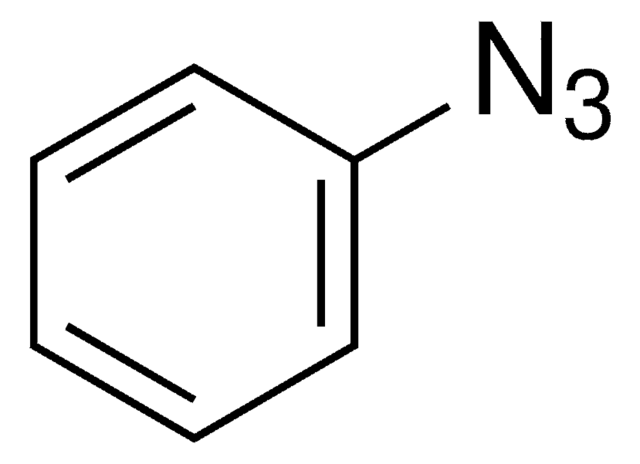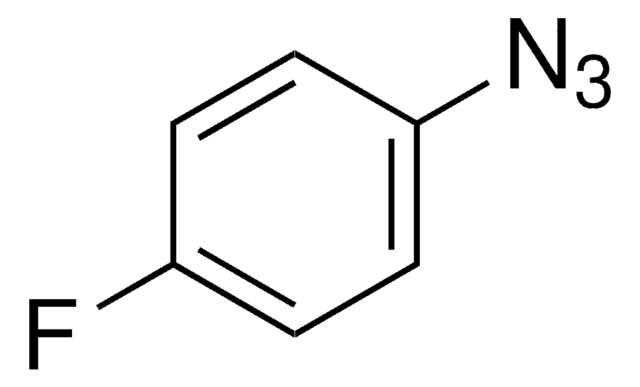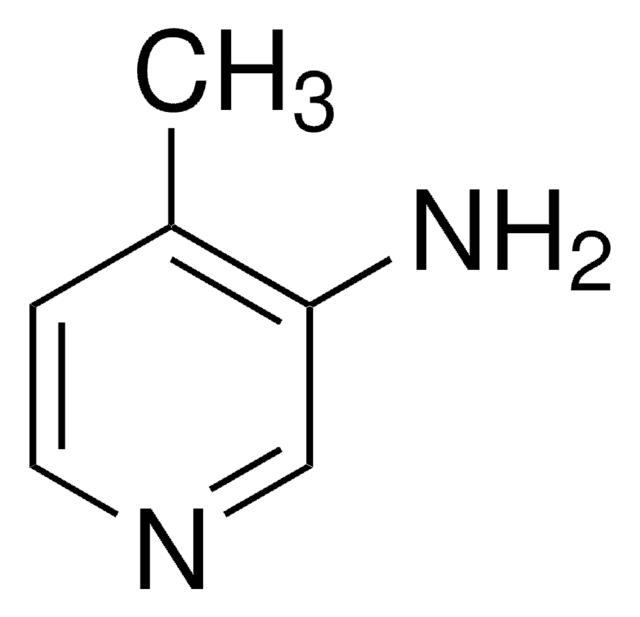742430
Benzyl azide solution
~0.5 M in dichloromethane, ≥95.0% (HPLC)
Synonym(s):
α-Azidotoluene solution, (Azidomethyl)benzene solution
About This Item
Recommended Products
Assay
≥95.0% (HPLC)
form
solution
concentration
~0.5 M in dichloromethane
impurities
≤2.0% water
storage temp.
2-8°C
SMILES string
[N-]=[N+]=NCc1ccccc1
InChI
1S/C7H7N3/c8-10-9-6-7-4-2-1-3-5-7/h1-5H,6H2
InChI key
UDLLFLQFQMACJB-UHFFFAOYSA-N
General description
Application
- Synthesis of Estrone Heterodimers and Evaluation of Their In Vitro Antiproliferative Activity.: This research investigates the synthesis of estrone heterodimers using benzyl azide as a key reagent, demonstrating significant antiproliferative activity, thus highlighting its potential in pharmaceutical intermediate synthesis (Bózsity N et al., 2024).
- Fluoride Abstraction Induced by Tris(pentafluoroethyl)difluorophosphorane: A Convenient Way to Synthesize Cationic N-Heterocyclic Carbene- and Cyclic (Alkyl)(amino)carbene-Ligated Copper Alkyne and Arene Complexes.: This paper describes a method for synthesizing copper alkyne and arene complexes using benzyl azide, emphasizing its role in innovative click chemistry applications (Riethmann M et al., 2024).
Signal Word
Warning
Hazard Statements
Precautionary Statements
Hazard Classifications
Carc. 2 - Eye Irrit. 2 - Skin Irrit. 2 - STOT RE 2 - STOT SE 3
Target Organs
Central nervous system
Storage Class Code
6.1D - Non-combustible acute toxic Cat.3 / toxic hazardous materials or hazardous materials causing chronic effects
WGK
WGK 3
Flash Point(F)
Not applicable
Flash Point(C)
Not applicable
Regulatory Listings
Regulatory Listings are mainly provided for chemical products. Only limited information can be provided here for non-chemical products. No entry means none of the components are listed. It is the user’s obligation to ensure the safe and legal use of the product.
PRTR
Class I Designated Chemical Substances
ISHL Indicated Name
Substances Subject to be Indicated Names
ISHL Notified Names
Substances Subject to be Notified Names
JAN Code
742430-VAR:
742430-BULK:
742430-10ML:4548173336121
742430-50ML:4548173336138
Certificates of Analysis (COA)
Search for Certificates of Analysis (COA) by entering the products Lot/Batch Number. Lot and Batch Numbers can be found on a product’s label following the words ‘Lot’ or ‘Batch’.
Already Own This Product?
Find documentation for the products that you have recently purchased in the Document Library.
Our team of scientists has experience in all areas of research including Life Science, Material Science, Chemical Synthesis, Chromatography, Analytical and many others.
Contact Technical Service










